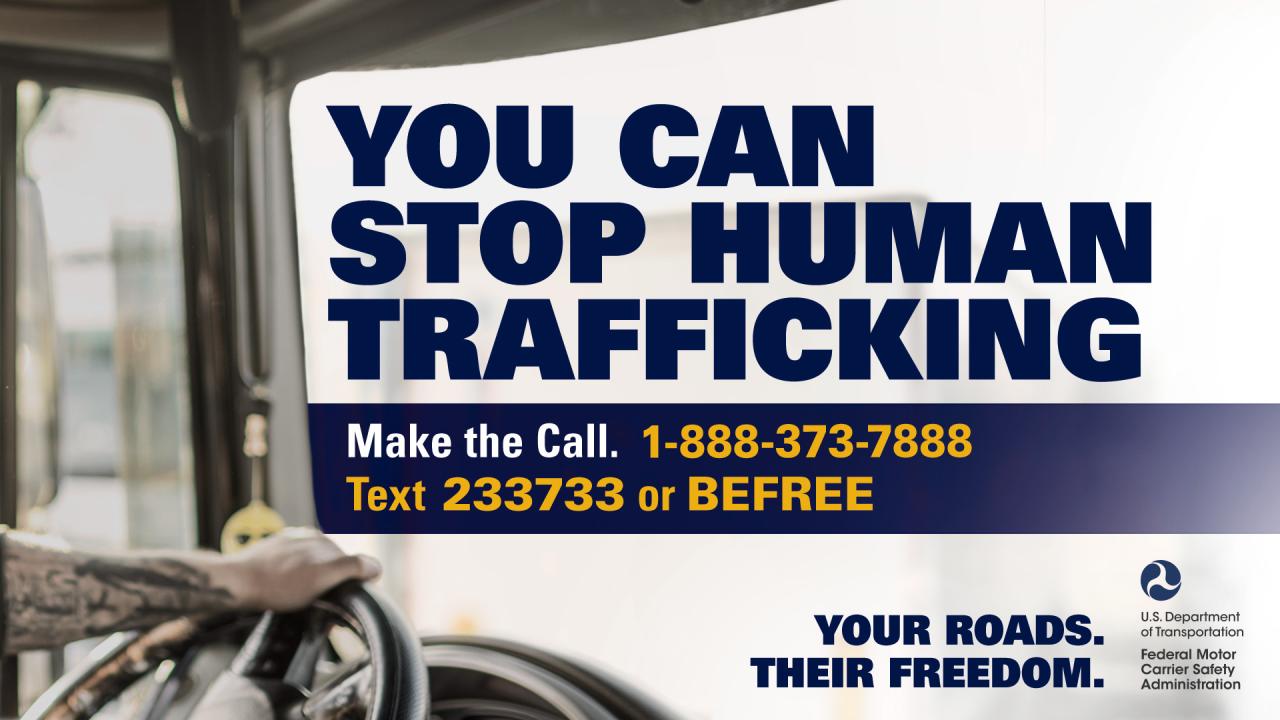Regulations

“Human trafficking takes place on every mode of transportation in America – and we must change that,” said U.S. Transportation Secretary Pete Buttigieg. “I ask all transportation professionals to join this effort, and it’s equally important for commuters and travelers to be empowered to recognize and report signs of human trafficking anywhere it happens in our transportation systems.”
Human trafficking involves the use of force, fraud, or coercion to obtain labor or a commercial sex act and the commercial sexual exploitation of children under any circumstances. The Federal Motor Carrier Safety Administration (FMCSA) combats human trafficking by working with public and private sector stakeholders to empower transportation employees and the traveling public to recognize and report possible instances of human trafficking.
To learn more about human trafficking and how the Federal Motor Carrier Safety Administration (FMCSA) is working to combat the crime, visit FMCSA’s "Your Roads, Their Freedom" Campaign and download resources for the commercial motor vehicle (CMV) industry at https://www.fmcsa.dot.gov/stophumantrafficking.
CDL Lifetime Disqualification for Human Trafficking
On July 23, 2019, FMCSA announced a final rule that permanently bans drivers convicted of human trafficking from operating a CMV for which a commercial driver’s license or a commercial learner’s permit is required. Following former President Trump’s signature of the “No Human Trafficking on Our Roads Act,” FMCSA has issued this new rule to prohibit an individual from operating a CMV for life if that individual uses a CMV in committing a felony involving a severe form of human trafficking. Review frequently asked questions about this rule here.
Review the published Federal Register Notice
Human Trafficking Prevention Act of 2022
On December 27, 2022, the U.S. Congress passed the Human Trafficking Prevention Act of 2022, designed to amend and add to the Trafficking Victims Protection Act of 2000, which laid the groundwork for the federal response to human trafficking. The Human Trafficking Prevention Act of 2022 requires the National Human Trafficking Hotline number be posted publicly in U.S. government buildings, airports, aircrafts, over-the-road buses, bus stations, passenger trains, passenger railroad stations, and ports of entry. The hotline number will be posted in visible areas and/or restrooms, where it can be easily seen and discreetly called.
Report a Tip
If you see (or suspect) any indicators of human trafficking, assess the situation. Do not attempt to confront a suspected trafficker or engage with a victim. Instead, please contact local law enforcement directly. Report to:
- 9-1-1, if someone is in immediate danger.
- The National Human Trafficking Hotline. (Línea Directa Nacional de Trata de Personas)
- Call 888-373-7888 or text HELP or INFO to BeFree (233733). (Texto 233733 o BEFREE)
- This hotline is a national, toll-free hotline available to answer calls from anywhere in the country, 24 hours a day, 7 days a week, 365 days a year. The hotline is operated by a nongovernmental organization funded by the federal government; it is not a law enforcement or immigration authority.
- Your company/organization.
- Follow your company’s reporting policy if they have one in place.
